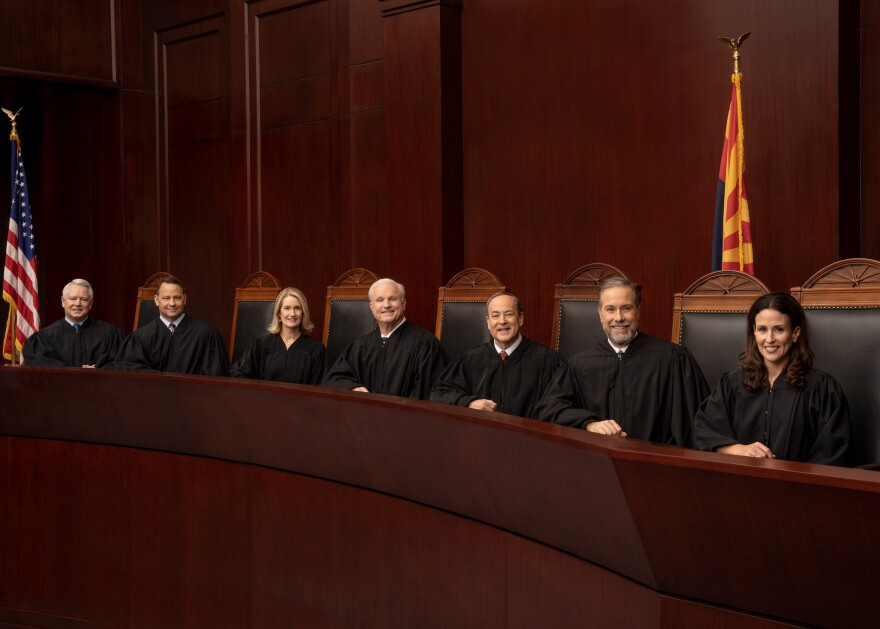By Howard Fischer
Capitol Media Services
PHOENIX -- Two national political organizations are gearing up to spend money to affect the results of the races in Arizona for state Supreme Court.
In an announcement Monday, the National Democratic Redistricting Committee and Planned Parenthood Votes said they intend to spend at least $5 million on supreme court races across the country. And the reason, they said, is because those courts have become crucial in protecting abortion rights since the U.S. Supreme Court overturned Roe v. Wade.
The focus, according to the groups will be in six states, including Arizona.
There already is a nascent effort by Progress Arizona to convince voters here to turn Clint Bolick and Kathryn King out of office in November. Both voted with the 4-2 majority to uphold the state's 1864 law banning abortions except to save the life of the mother, saying it trumps a more recent statute allowing the procedure until the 15th week of pregnancy.
At the same time, several lawyers have formed a committee to convince voters to retain the judges, saying that their vote on this individual issue should not disqualify them from a new six-year term.
And state Sen. David Gowan, R-Sierra Vista, is pushing a ballot measure that, if approved, would overrule any decision by voters in November to oust either of them.
The common thread in all of this is the belief by the organizations that they need to exercise political influence at the Supreme Court level to ensure that justices -- and the decisions they reach -- do not undermine their goals.
"We are in the fight of our lives to protect and restore our fundamental freedoms, and our courts are the front lines,'' said Alexis McGill Johnson, president and CEO of Planned Parenthood Action Fund, the political arm of the organization which operates Planned Parenthood Votes.
"Opponents of abortion access, LGBTQ+ equality and democracy itself are tilting the scales of justice by stacking courts that will care out their destructive agendas,'' she said in a prepared statement. "If this continues, we will surely see more devastating decisions upholding abortion bans, limiting care like in-vitro fertilization, and denying transgender people their dignity.''
Some of the targeted states, like Michigan, have direct election of judges, though they are on a separate nonpartisan ballot.
In places like Arizona, though, Supreme Court justices are named by the governor who must choose from a list prepared by a screening panel. They can remain in office until age 70, subject to having to stand for reelection on a retain-or-reject basis.
A judge turned out by voters is replaced through the same process.
That has never happened in Arizona, at least at the Supreme Court level. But attitudes could be changing.
One factor is that then-Gov. Doug Ducey, a Republican, convinced the Republican-controlled Legislature in 2016 to expand the court from five members to seven. That occurred despite unanimous opposition from all the sitting justices from both parties.
That allowed Ducey to name two Republicans to the court.
All seven justices now are Republicans, though two -- Robert Brutinel and Ann Scott Timmer -- were appointed by Jan Brewer, Ducey's predecessor. They also are the two justices who dissented from last month's ruling and voted to uphold the 15-week ban.
State lawmakers have since voted to repeal the ban. But that cannot take effect for at least three months. And in the interim, the justices have agreed to delay their original order to reinstate the old law, leaving the 15-week statute in effect for the time being.
Only King and Bolick are on the ballot this year. Ousting them in November would give Hobbs her first chance to put her stamp on the court with her own picks.
Both justices have declined to comment on the moves to deny them new terms.
Johnson, in her statement, said the outcome of races like this are crucial.
"We cannot afford to lose the fight for fair, unbiased courts,'' she said. "Our futures hang in the balance.''
Joining her group is the National Democratic Redistricting Committee, headed by Eric Holder Jr., the former attorney general in the Obama administration.
"The notion that the outcome of a case should be determined by the makeup of a court is antithetical to accepted American jurisprudence,'' he said in his own statement.
"Yet that is exactly what is happening in too many state supreme courts across the country,'' Holder continued. "It is a result of a deleterious, years-long effort by partisan interests to turn state judiciaries into yet another political instrument to force unpopular, minority-supported policies onto the people.''
In the case of Holder's organization, its concerns are likely different, aimed at ensuring that state courts do not issue rulings that affect the lines for congressional and legislative districts in a manner that affects Democratic interests.
Aside from Arizona, other states with supreme court elections this year that are being targeted by the groups are Michigan, Montana, North Carolina, Ohio and Texas.
Progress Arizona announced its own efforts last month to oust Bolick and King in the wake of the Arizona Supreme Court ruling about the 1864 law.
"This decisions is not in line with what voters want,'' said Abigail Jackson on behalf of the political action group. "If Arizona voters want to use the power than the constitution gives them to hold them accountable, and their main concern is this ruling, then I think voters are within the rights and powers to do so.''
Jackson said her organization also is opposed to an effort by Sen. Gowan to change the constitution to exempt most judges from having to stand for reelection on a regular basis. Instead, his SCR 1044 would allow them to continue to serve unless there were some interceding event to put their names to voters, like a felony conviction, personal bankruptcy, mortgage foreclosure, or if the Commission on Judicial Performance Review concluded their performance on the bench fell below standards.
—--
On X and Threads: @azcapmedia


